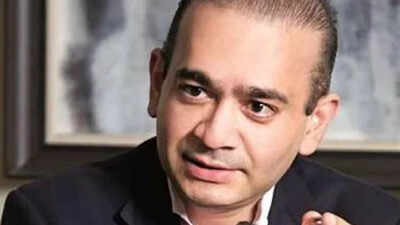Top Searches
- News
- Business News
- India Business News
- Fugitive Nirav Modi loses bid to appeal against extradition to India in UK Supreme Court
Fugitive Nirav Modi loses bid to appeal against extradition to India in UK Supreme Court

Nirav Modi
NEW DELHI: Fugitive diamond merchant Nirav Modi on Thursday suffered another setback in his legal battle as he lost a bid to take his fight against extradition to India on charges of fraud and money laundering to the UK’s Supreme Court. The ruling leaves Nirav Modi with very few options to remain in the UK.
What did the London High Court order?
In a judgment order pronounced at the Royal Courts of Justice in London, Lord Justice Jeremy Stuart-Smith and Justice Robert Jay ruled that “the Appellant's (Nirav Modi) application for permission to appeal to the Supreme Court is refused".
The court also rejected Nirav Modi's application for certification of a point of law. The judges ruled that the "certification of a point of law be refused" that would have permitted his case to go before a higher court.
An appeal on the grounds of a point of law of general public importance is a high threshold that is not met very often and this refusal significantly limits Modi's remaining legal options in the UK against extradition to India.
The court judgement also requires Nirav Modi to pay £150,247 in legal fees associated with the latest application.
Nirav Modi has argued there is a high risk of suicide if he is extradited. The judge said that the risk of suicide if Modi is extradited may be high, but that the arrangements at the prison “will enable the authorities to cope properly with Mr Modi’s condition”.
What options does Nirav Modi has now?
As his attempt to have his appeal heard in the Supreme Court of London has now failed, Nirav Modi can apply to the European Court of Human Rights (ECHR) to try and block his extradition on the grounds that he will not receive a fair trial and that he will be detained in conditions that violate Article 3 of the European Convention on Human Rights, to which the UK is a signatory.
The threshold for an ECHR appeal is also extremely high because he would also have to demonstrate that his arguments on those grounds before the UK courts have been previously rejected.
When will Nirav Modi be extradited to India?
According to UK Home Office officials, it is still unclear when Nirav Modi would be extradited as he still has legal challenges open to him.
The process to remove him from the UK may still take time. Liquor baron Vijay Mallya, who is also wanted in India on allegation of loan fraud, in 2020 lost permission to take his extradition to the Supreme Court but is yet to be extradited.
What does this mean for Indian agencies?
The decision is a boost to India’s efforts to get the custody of the infamous fugitive who became the poster boy for a series of bank frauds over the past decade in the diamond industry in India, which cuts or polishes about 90% of the world’s supply.
The Central Bureau of Investigation (CBI) and Enforcement Directorate (ED) case against the businessman, who has been imprisoned since his detention in March 2019 on an extradition order, marked a major win last month with the denial of the High Court appeal.
Here in India, the diamantaire is facing three separate criminal cases: the CBI case involving the PNB fraud, which resulted in losses exceeding GBP 700 million; the ED case involving the alleged laundering of those proceeds; and a third criminal case involving the alleged tampering with evidence and witnesses in the CBI proceedings.
Then UK Home Secretary, Priti Patel, had ordered Modi's extradition based on Judge Sam Goozee's Westminster Magistrates' Court ruling in April 2021 and the case is now in its final stages of legal appeals.
(With inputs from agencies)
What did the London High Court order?
In a judgment order pronounced at the Royal Courts of Justice in London, Lord Justice Jeremy Stuart-Smith and Justice Robert Jay ruled that “the Appellant's (Nirav Modi) application for permission to appeal to the Supreme Court is refused".
The court also rejected Nirav Modi's application for certification of a point of law. The judges ruled that the "certification of a point of law be refused" that would have permitted his case to go before a higher court.
An appeal on the grounds of a point of law of general public importance is a high threshold that is not met very often and this refusal significantly limits Modi's remaining legal options in the UK against extradition to India.
The court judgement also requires Nirav Modi to pay £150,247 in legal fees associated with the latest application.
Nirav Modi has argued there is a high risk of suicide if he is extradited. The judge said that the risk of suicide if Modi is extradited may be high, but that the arrangements at the prison “will enable the authorities to cope properly with Mr Modi’s condition”.
What options does Nirav Modi has now?
As his attempt to have his appeal heard in the Supreme Court of London has now failed, Nirav Modi can apply to the European Court of Human Rights (ECHR) to try and block his extradition on the grounds that he will not receive a fair trial and that he will be detained in conditions that violate Article 3 of the European Convention on Human Rights, to which the UK is a signatory.
The threshold for an ECHR appeal is also extremely high because he would also have to demonstrate that his arguments on those grounds before the UK courts have been previously rejected.
When will Nirav Modi be extradited to India?
According to UK Home Office officials, it is still unclear when Nirav Modi would be extradited as he still has legal challenges open to him.
The process to remove him from the UK may still take time. Liquor baron Vijay Mallya, who is also wanted in India on allegation of loan fraud, in 2020 lost permission to take his extradition to the Supreme Court but is yet to be extradited.
What does this mean for Indian agencies?
The decision is a boost to India’s efforts to get the custody of the infamous fugitive who became the poster boy for a series of bank frauds over the past decade in the diamond industry in India, which cuts or polishes about 90% of the world’s supply.
The Central Bureau of Investigation (CBI) and Enforcement Directorate (ED) case against the businessman, who has been imprisoned since his detention in March 2019 on an extradition order, marked a major win last month with the denial of the High Court appeal.
Here in India, the diamantaire is facing three separate criminal cases: the CBI case involving the PNB fraud, which resulted in losses exceeding GBP 700 million; the ED case involving the alleged laundering of those proceeds; and a third criminal case involving the alleged tampering with evidence and witnesses in the CBI proceedings.
Then UK Home Secretary, Priti Patel, had ordered Modi's extradition based on Judge Sam Goozee's Westminster Magistrates' Court ruling in April 2021 and the case is now in its final stages of legal appeals.
(With inputs from agencies)
FOLLOW US ON SOCIAL MEDIA
FacebookTwitterInstagramKOO APPYOUTUBE
Start a Conversation
end of article









